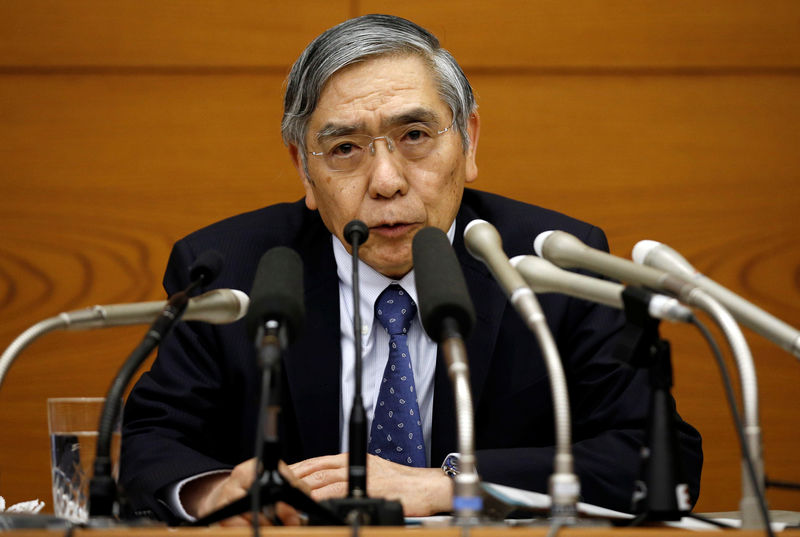 © Reuters. BOJ Governor Kuroda attends a news conference at the BOJ headquarters in Tokyo
© Reuters. BOJ Governor Kuroda attends a news conference at the BOJ headquarters in TokyoBy Leika Kihara
TOKYO (Reuters) – Japan’s central bank governor said on Thursday improving productivity in the services sector was essential for pulling the economy permanently out of deflation and called on firms to use their cash piles on wages and capital expenditure.
Haruhiko Kuroda said productivity in Japan’s non-manufacturing sector was only about 70 percent of the levels seen in the United States and Europe, adding that there was room to catch up with Japanese manufacturers, who are among the world’s most competitive.
“This is a sector where there’s an opportunity to raise productivity and push up real wages,” Kuroda told parliament, when asked by a lawmaker on what steps could be taken to boost Japan’s growth potential.
Japanese non-manufacturers have been ramping up spending on software and equipment, partly to streamline operations as they struggle to hire amid a tightening lob market, Kuroda said.
“It’s most important for Japan’s economic prospects to boost productivity” in sectors like transportation, construction and public works projects, he added.
The lower house of parliament is set to approve on Friday the government’s plan to reappoint Kuroda for another five-year term, with his current one ending in April.
Core consumer inflation stood at 0.9 percent in January from a year earlier, well below the BOJ’s 2 percent target, despite the economy enjoying its longest run of expansion in 28 years.
The BOJ has blamed Japan’s sticky “deflationary mindset,” or companies’ reluctance to raise wages or prices, for delaying achievement of its price target.
“Deflationary mindset persists not just among companies but households,” Kuroda said. “We need to have people understand that higher wages and achievement of 2 percent inflation are important to creating a virtuous economic cycle.”
On growing criticism over the cost of prolonged easing, Kuroda conceded that the central bank’s powerful monetary easing has had a significant impact on financial institutions’ profits.
“I don’t see a serious problem emerging in financial intermediation now. But we will closely watch how our policy affects bank profits, financial intermediation and the stability of Japan’s banking system,” he said.
Kuroda has repeatedly said the BOJ was in no rush to follow in the footsteps of other central banks in dialing back crisis-mode stimulus, as inflation remained well below its target.
But some central bank policymakers have raised concerns over the rising cost of extended easing, such as the hit ultra-low rates inflict on narrowing bank margins.
Fusion Media or anyone involved with Fusion Media will not accept any liability for loss or damage as a result of reliance on the information including data, quotes, charts and buy/sell signals contained within this website. Please be fully informed regarding the risks and costs associated with trading the financial markets, it is one of the riskiest investment forms possible.
Source: Investing.com


























